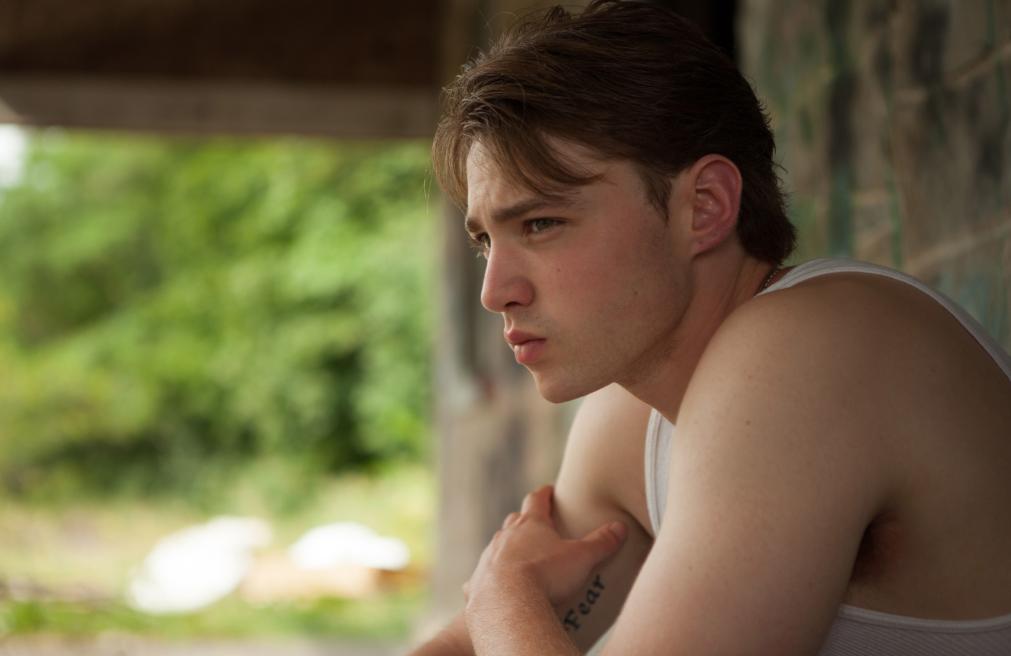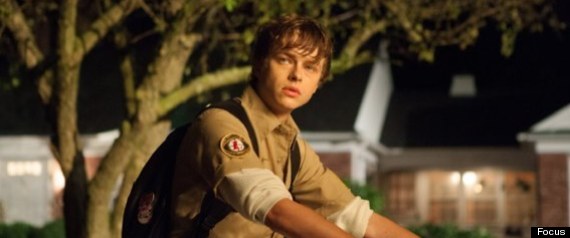
Compares favorably to Drive. Both Nicolas Winding Refn's Drive and Derek Cianfrance's Place Beyond the Pines have in common the laconic, handsome, blue-eyed presence of Ryan Gosling. So, for that matter does the film at hand and Mr. Cianfrance's first feature, Blue Valentine, though Gosling's physical appeal was somewhat muted in that film at the service of character.
The Place Beyond the Pines, in its rangy 140 minutes, is, to some extent two films in one. There is the past (presumably) in which the film begins, with it's converging fates of motorcycle ace turned bank robber Luke Glanton (Gosling) and law school graduate turned policeman Avery Cross (Bradley Cooper). Then we are taken to the place beyond the past, some 15 years on, when the film ascends (or tries, it seems) into the mythological, with its sins of fathers visiting sons and the younger generation's attempt to break away from or follow suit in their way.
 |
| Ryan Gosling and his satin jacket in Nicolas Winding Refn's Drive. |
It is in that first part of The Place Beyond the Pines that the comparisons to Drive are numerous and generally flattering for the present film. In both cases, Gosling plays expert drivers either abetting or directly committing heists, a kind of innocent among more corrupt figures, though capable of ruthless and efficient violence once provoked. Mr. Cianfrace's aesthetics are certainly more satisfying than those of Refn, who draped Drive in - music, wardrobe, titles, etc. - the worst of the 1980's. The soundtrack of Place Beyond the Pines is a good deal more varied and its palate usually richer. There is a brief scene between Luke and his employer and eventual criminal partner, Robin (Ben Mendelsohn), in which the latter's skin appears almost indigo, picking up the color of his dark shirt and the unnatural glow of interior light.
The Place Beyond the Pines, like Drive, finds a good bit of its richness and grit in its outer circle of minor characters, Mendelsohn's Robin Van Der Zee, perhaps the best among them. Thanks to the writing of Ciafrance and his co-writers Ben Coccio and Darius Marder and the subtleties of Mr. Mendelsohn's work, Robin comes to life as one of those charismatic figures that materialize in life, perhaps the man who might stop to offer help when you're broken down by the side of the road. You're not sure if the stranger will help you, kill you, or both. Robin and Luke meet in a similar manner, though the motorcycle rider is offered a ride back to town when he doesn't need one. It's not entirely clear if Luke has been recruited for his way with a motorcycle, to take the edge off the mechanic's loneliness, or perhaps some mix of the two. The relationship almost hints at the homoerotic, at least on the part of Robin. A brief scene of celebration after a successful heist sees the older man just awkwardly touch the younger, unsure how to express his mix of emotion. So it goes with men, particularly those in Mr. Cianfrance's two features, unsure of what to do with the hands and certainly their emotions at times.
 |
| Ben Mendelsohn as Robin Van Der Zee in The Place Beyond the Pines. |
What The Place Behind the Pines has that Drive lacked is a credible female character. This Romina (Eva Mendes), who appears rather obviously bralessly at the carnival where Luke is employed as a stunt rider, one of three men on motocross bikes who zip around the inside of a metal sphere. For the sake of equal opportunity, we get a fine gander at Mr. Gosling's physique as well. The film begins in his carnival trailer, in which he's stripped to the waist, displaying a lean, muscular torso, which, along with arms and other free skin (a tiny dagger and drop of blood off the left eye) serves as a graffiti zone for images and cryptic verbiage. An example of the latter is the word "THROB" up the left side of his next. His bike, as it happens, THROBS too, until painted over in black for bank-robbing anonymity. It may well be the Luke and the bike throb for one another, such the sometimes profound relationship between man and his machine. As for Romina, much as her physical appeal is first announced to us as well as to the handsome carnival rider, most of what follows with the woman who is revealed to be the mother of Luke's child - product of their one-night relationship when the carnival was previously in town - reveals the relative complexity of her character. She's trying to balance work, school and motherhood while pulled between the man with whom she lives, Kofi (Mahersala Ali), and Glanton. Ms. Mendes expresses well all of the conflicting claims her character's affections and needs. Unfortunately, once The Place Beyond the Pines flashes forward to address all the man issues, she's given little to do.
Such is "Pines" commitment to character that even the that of Kofi, appearing but in a few brief scenes, seems fully formed. And refreshingly, in a film in which the white guys from each side of the tracks are too distracted by ambition or a penchant for violence, too absorbed with their own needs to be competent parents, it's a black man who sticks around to provide a strong, wise model of fatherhood. That, obviously, not exactly the norm for mainstream film or culture.
The connection - after Luke Glanton exits stage left, or at least bedroom window center - between film past and present is the character of Avery Cross. He's first seen as the nervous young policeman pursuing Glanton after a bank robbery during which everything that can go wrong does. The first glance of Bradly Cooper is of those modest jug ears. It's all we need to identify him; the only nonconformists among his sharp, contained, leading man features. The result of Cross' showdown with the bank robber, aside from a bullet to the leg, is the former's lionization as local and police force hero.
 There's some glory for Cross to savor, but the return to terra firma is quick, the landing unpleasant. Before returning to active duty, a group of colleagues, led by Deluca (Ray Liotta) take him on a raid of sorts to the house of Romina and Kofi. It's one of "Pines" more far-fetched scenes - not for the abuse of power, but what the police seek and how easily it is found. But it's a disquieting scene, none-the-less.
There's some glory for Cross to savor, but the return to terra firma is quick, the landing unpleasant. Before returning to active duty, a group of colleagues, led by Deluca (Ray Liotta) take him on a raid of sorts to the house of Romina and Kofi. It's one of "Pines" more far-fetched scenes - not for the abuse of power, but what the police seek and how easily it is found. But it's a disquieting scene, none-the-less.
As with Bruce Greenwood's gravelly performance as the town's district attorney, Bill Killcullen, the Deluca character is another of those that so solidly fill out The Place Beyond the Pines. Ray Liotta's sinister appeal has aged nicely, all the more effective for its petrification in graying hair, the hint of more roundenss of countenance and figure of middle age.
The leap of 15 years takes us to a present day in which two other lives converge, those of teenagers Jason Glanton (Dane DeHaan) and AJ Cross (Emory Cohen). Much of how this relationship begins and proceeds has a familiar truth about it. The young Cross is brawny and full of bluff, his patched together persona a mix of East Coast machismo (he's usually to be seen in sleeveless white t-shirts) and a white kid's appropriated gangsterism. Given that, and an unquenchable appetite for alcohol and drugs, AJ is not quite the ideal son to a father with state-wide political ambition (after the lapse of years, we find Avery Cross in the midst of a run for New York Attorney General.). As with that earlier meeting of Glanton and Van Der Zee, there might be a mix of motives when the troubled AJ, new to the local high school, spots the loner Jason Glanton in the lunchroom. But whatever desire for friendship that might propel the young Cross to Glanton, he seems even more motivated to find someone who can score him drugs. In a version of the sad, immemorial tale of the unpopular kid trying to find acceptance among the rich and famous of high school society, Jason Glanton goes so far as to rob a pharmacy of Oxycontin to appease AJ Cross. An unfortunate parallel, obviously, of his biological father's downward spiral.
Both DeHaan and Cohen are good in their way, conveying their adolescents' mix of vulnerability and anger. As Jason grows curious about his father, there is one of the stronger sequences in The Place Beyond the Pines, in which the son seeks out Luke Glanton's former employer and partner in crime, Robin. As with every scene involving Van Der Zee, it's hard to say just might might happen, how darkly shaded the encounter might be. What does transpire is Jason Glanton's touching reversion to an even younger boy than he his, trying on a father's garish old sunglasses, inquiring after some thing at which he excelled, attempting to cloth his lonely soul in something that might fit
How satisfying one finds The Place Beyond the Pines might well rest on how willing one is to make that leap of 15 years. To go beyond it's well rendered details to the rather fairly vague outlines of something more grand. At the very least, there is the need to harness a good bit of imagination to work out how Avery Cross managed to survive, even thrive in a town in which he informed on a good portion of its police force.
The film's climax, occurring after Jason Glanton discovers the connection between himself, AJ Cross and (especially) the elder Cross is not particularly plausible in its outcome and aftermath. And Cooper, better more recently as half of the (sort of) crazy duo in Silver Linings Playbook, isn't quite as strong as he needs to be for the heightened emotions of this climactic confrontation. As The Place Beyond the Pines really tries to stretch its wings and soar off into the big story, the big film it has been so intent on being, you either get carried along or you don't. But even if it's the latter, there's much in the film's particulars to justify the investment of those 140 minutes.
db






Comments
Post a Comment